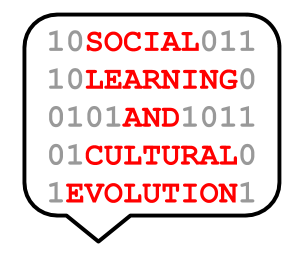Program
Monday July 4th 2016
SESSION 1: 14:30 – 16:15
14:30 – 14:35 WELCOME
14:35 – 15:15 KEYNOTE
John Bullinaria (University of Birmingham, UK)
“Simulating Social and Individual Learning in Models of Life History Evolution”
Previous studies of the effect of lifetime learning on the evolution of life histories (i.e. the key events in the lifetimes of each species) have involved simulating populations of individuals evolving by natural selection to learn to perform well, with each individual learning appropriate behaviors from interaction with their environment. In reality, there is more to learning than direct individual experience, because it often involves a substantial degree of social learning too. This talk overviews my recent work on formulating social information transfer in terms of memes, and developing a process for merging that information with the (possibly inconsistent) information acquired by direct experience. This has resulted in a general framework for meme-based simulations which enables more complete investigations of learning as a factor in life history evolution. Results are presented for a range of learning variations and representative life history factors that illustrate the types of interactions and trade-offs that can emerge, and indicate the kinds of species specific models that could be developed with it in the future.
15:15 – 15:35
Mohiul Islam (Concordia University, Canada)
Modeling the Evolution of Mimicry
Authors: Mohiul Islam and Peter Grogono
15:35 – 15:55
Roberto Ulloa (University of Western Ontario, Canada)
Culsim: A Simulator of Emergence and Resilience of Cultural Diversity
Author: Roberto Ulloa
15:55 – 16:15:
Chris Marriott (University of Washington, USA)
Authors: Chris Marriott and Jobran Chebib
16:15 – 16:45 COFFEE
SESSION 2: 16:45 – 18:30
16:45 – 17:25 KEYNOTE
Francisco C. Santos (University of Lisbon, Portugal)
“Evolutionary Dynamics of Collective Action"
The emergence and sustainability of cooperation, traversing areas as diverse as Ecology, Economics, Political Science or Psychology, is perhaps one the most paradigmatic open questions in complex systems simulation and interdisciplinary research. Cooperation dilemmas occur at all scales and levels of complexity, from cells to global governance. In all cases the tragedy of the commons threatens the possibility of reaching the optimal solution associated with global cooperation. By combining evolutionary game theory, social learning, stochastic population dynamics, and network science, hopefully in a self-contained way, I will propose one of many possible overviews on the foundations of collective action and cooperation, from reciprocity, and reputations, to the role played by peer-influence and the intricate nature of our socialties.
17:25 – 17:45
James M. Borg (Keele University, UK)
Social Learning Strategies: Who you learn from affects how new behaviours are discovered
Author(s): James M. Borg, Ben P. Jolley and Alastair Channon
17:45 – 18:05
Evert Haasdijk (VU University of Amsterdam, Netherlands)
Author(s): Julien Hubert, Jacqueline Heinerman and Evert Haasdijk
18:05 – 18:30 DISCUSSION SESSION
Artificial Life and the study of Social Learning and Cultural Evolution: Aims, Objectives, Questions, Definitions and Future Progress.
